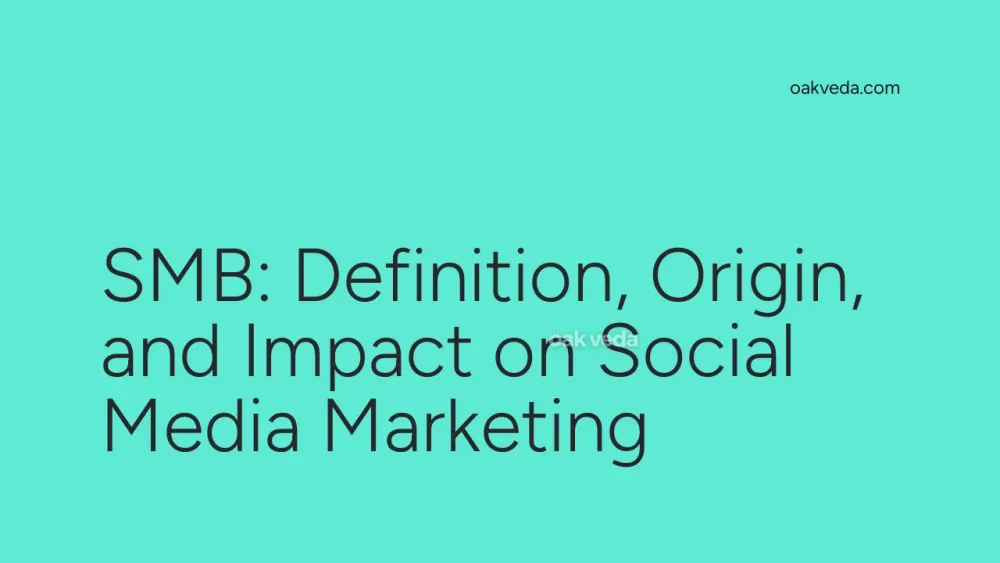
What is SMB?
SMB stands for Small and Medium-sized Business. In the context of social media and digital marketing, SMB refers to companies that fall within specific size parameters, typically based on factors such as annual revenue, number of employees, and scale of operations. These businesses often have unique challenges and opportunities when it comes to leveraging social media for growth and customer engagement.
Origin and Development of SMB in Social Media
The term SMB has been used in business contexts for decades, but its relevance in social media marketing has grown significantly in recent years. As social platforms have evolved from personal networking tools to powerful marketing channels, SMBs have found new opportunities to compete with larger corporations on a more level playing field.
How SMB Works in Social Media Marketing
For SMBs, social media offers a cost-effective way to:
- Build brand awareness
- Engage with customers directly
- Drive website traffic
- Generate leads and sales
SMBs often leverage social media platforms like Facebook, Instagram, Twitter, and LinkedIn to create a strong online presence without the need for large marketing budgets.
Types of SMBs in Social Media
While the definition of SMB can vary by country and industry, they generally fall into two categories:
- Small businesses: Usually have fewer than 50 employees and lower annual revenue
- Medium-sized businesses: Typically have 50-250 employees and higher revenue than small businesses
Each type of SMB may approach social media marketing differently based on their resources and goals.
Popular Examples of SMBs Succeeding on Social Media
Many SMBs have found success through creative social media strategies:
- Wendy's: Known for its witty Twitter presence
- Glossier: Built a cult following on Instagram
- Dollar Shave Club: Went viral with humorous YouTube videos
These examples show that SMBs can achieve significant reach and engagement through clever use of social platforms.
Impact of SMBs on Social Media Culture
SMBs have had a profound impact on social media culture:
- Authenticity: SMBs often bring a more personal touch to their social media presence
- Community building: They excel at creating tight-knit online communities
- Innovation: Limited resources often lead to creative marketing approaches
Controversies or Debates Surrounding SMBs on Social Media
Some debates around SMBs and social media include:
- Algorithm changes: Concerns that platform updates favor larger businesses with bigger budgets
- Data privacy: Challenges in navigating complex data regulations with limited resources
- ROI measurement: Difficulties in accurately measuring the return on social media investments
How SMBs Use Social Media
SMBs typically use social media for:
- Customer service: Responding to inquiries and complaints
- Content marketing: Sharing valuable information to attract and retain customers
- Product launches: Announcing new offerings to a engaged audience
- Local marketing: Targeting specific geographic areas
- Influencer partnerships: Collaborating with micro-influencers for cost-effective promotion
Future Trends for SMBs in Social Media
Looking ahead, SMBs can expect:
- Increased use of AI and automation: Tools like Later are making it easier for SMBs to manage social media efficiently
- Focus on video content: Short-form video platforms like TikTok are becoming essential for SMB marketing
- Social commerce: More integrated shopping experiences within social platforms
- Personalization: Leveraging data to create more targeted content and ads
FAQs about SMBs and Social Media
-
What's the best social media platform for SMBs? It depends on the business type and target audience. Instagram and Facebook are popular for B2C, while LinkedIn is often preferred for B2B.
-
How much should an SMB spend on social media marketing? There's no one-size-fits-all answer, but many SMBs allocate 5-15% of their revenue to marketing, with a portion dedicated to social media.
-
Can SMBs compete with larger companies on social media? Yes, by focusing on niche audiences, creating authentic content, and leveraging their agility to respond quickly to trends.
-
What are some free tools SMBs can use for social media management? Hootsuite, Buffer, and Canva offer free plans that can help SMBs manage their social media presence effectively.
-
How often should SMBs post on social media? Consistency is key, but the frequency can vary. A general rule is 1-2 times per day on platforms like Facebook and Instagram, and 3-5 times on Twitter.
In conclusion, SMBs play a crucial role in the social media landscape, bringing diversity, authenticity, and innovation to digital marketing strategies. As social platforms continue to evolve, SMBs that adapt quickly and leverage the right tools and strategies will find significant opportunities for growth and customer engagement in the digital space.
You may be interested in:
- POV Video: Definition, Origin, and Impact on Social Media
- Sleep On: Definition, Origin, and Impact on Social Media
- Hoo.be: Definition, Origin, and Impact on Creator Marketing
- Big Yikes: Definition, Origin, and Impact on Social Media
- Ok Boomer: Definition, Origin, and Cultural Impact
- Komi: Definition, Origin, and Impact on Creator Marketing

